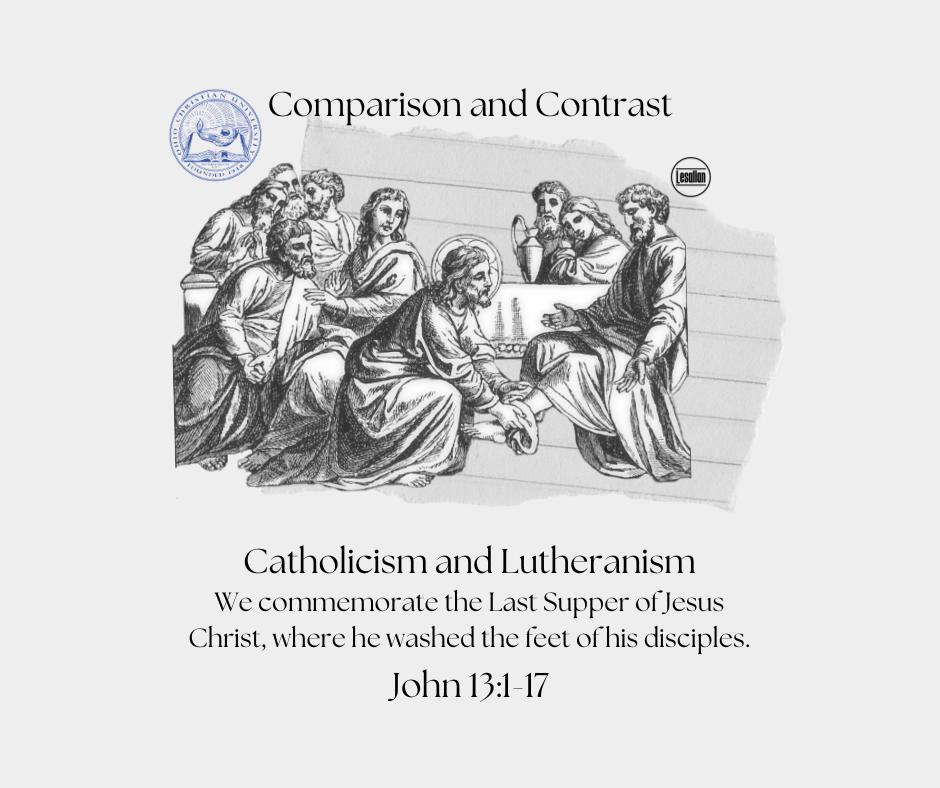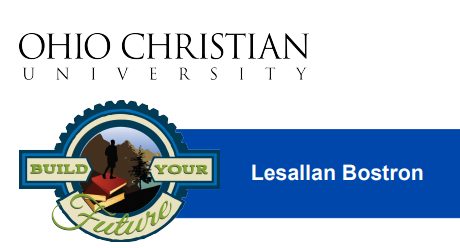By Lesallan Bostron
FNA1000 Fine Arts Appreciation (ONAA58)
Ohio Christian University
Dr. Brent Nolte
May 17, 2023

Comparison and Contrast – Catholicism and Lutheranism
In Catholic worship practices, the priest is entrusted with leading the congregation and providing spiritual counsel and guidance to its members. The priest’s foremost responsibility is to faithfully execute the ministry of the Word and sacrament by conveying God’s message to the congregation with utmost sincerity. The duties of a pastor in Lutheran churches nowadays tend to differ based on the denomination and congregation. Typically, a pastor is tasked with organizing and directing worship services, promoting spiritual growth through regular, Bible and confirmation classes, and extending support and pastoral care during trying times, which may involve trips to hospitals and nursing homes. Additionally, the pastor performs official duties such as conducting baptisms, weddings, and funerals. In the ELCA, pastors devoutly fulfill their responsibilities by providing the assurance of sacraments and sharing the teachings of Jesus Christ in diverse ministry environments. Some pastors are designated to serve in particular roles, such as chaplaincy and campus ministry.
Martin Luther, ordained as a priest in 1507, eventually opposed certain beliefs and customs of the Roman Catholic Church. He believed in the idea of the priesthood of all believers, which means that anyone who has faith in Christ and is baptized becomes a priest and participates in Christ’s royal priesthood. This principle implies that every believer has the same privilege to approach the Father through Jesus and is accountable for ministering as a priest to other believers, focusing on sharing Scriptural teachings. According to Luther, there is no spiritual distinction between priests and laypeople. All baptized believers belong to the same “estate.” Luther viewed ordination as a way to select preachers and not a permanent status. Unlike in the Roman Catholic tradition, the priesthood is not an irreversible position. Instead, a ministry can be started or stopped depending on the requirements.
The choir serves various liturgical roles within Catholic worship practices, such as performing solos, leading congregational singing, encouraging participation, and providing choral embellishments to enhance the overall experience. In the interpretation of worship according to Lutheranism, individual voices, choirs, organs, and other instruments must enhance the congregation’s musical participation. Martin Luther acknowledged the choir’s importance but emphasized their need to enable the congregation’s singing rather than dominate it. To this day, choirs and other singing groups must be mindful of their role in worship and ensure that they guide the singing rather than overthrow the assembly’s vocals.
In Catholic worship practices, active participation of the congregation is achieved through prayer and song. However, Roman worship has shifted from the work of the people (liturgy) to the work of the clergy beyond the Eucharist. As a result, the Mass language is solely in Latin, and the elements of the Table are not accessible to the laity. Even the music is performed only by approved singers.
Martin Luther was crucial in transforming Catholic worship from a priest-dominated practice to a more accessible evangelical service for congregations. He staunchly believed in the doctrine of the priesthood of all believers, which designates anyone who has faith in Christ and is baptized as a priest who shares in Christ’s royal priesthood. This principle ensures that every believer has equal access to the Father through Jesus and holds the responsibility of acting as a priest to fellow believers, especially by sharing the Scripture with them. Martin Luther held conservative views when it came to worship. He believed that the Church should preserve all valuable traditions that did not hinder the proclamation of the Gospel. Luther adhered to his time’s basic worship pattern, and the liturgical calendar, including seasonal and scriptural readings (Leahy, 2016). Luther’s implementation of liturgical reform facilitated the inclusion of congregational songs in religious services, elevating the level of musical participation. Moreover, his emphasis on music education improved the musical literacy of congregants, enabling them to contribute more effectively to the services.
Luther believed that salvation could be achieved through faith in God, repentance for one’s sins, and acceptance of God’s mercy. The idea of justification by faith implies that an individual’s faith is enough to gain entry into heaven. Luther and his followers had a contrasting perspective compared to the Catholic Church on the concepts of sin and salvation. The Catholics maintained that following the Church’s teachings and sacraments was crucial to earn salvation, whereas the Lutherans believed that faith alone was sufficient to receive salvation as a gift from God. Individuals who genuinely believed in Jesus Christ repented for their transgressions, and recognized the Bible as the absolute truth would attain salvation. The faithful would perform righteous actions and abstain from wrongdoing not to earn salvation, but because it was God’s decree (Origins of Lutheranism Lutheran Beliefs about the Ultimate Source of Authority, n.d.).
In Catholic Prayers, there are four that frequently emphasize the sacrificial aspect of the Mass. These prayers request God’s blessings on the bread and wine and express gratitude for His mercy that has made them accessible. In contrast, the two Lutheran Eucharistic Prayers predominantly recount the history of salvation from creation and Abraham to the Incarnation and Second Coming (Fielding, 1994). According to Fielding (1994), Catholic Prayers convey the notion that the upcoming event is a vibrant and ongoing sacrifice, while Lutheran Prayers focus on affirming a completed action that is to be commemorated. According to Fielding (1994, p. 51), this central difference is the primary contrast between Catholic and Lutheran liturgies and Eucharistic theologies. Martin Luther believed that sacraments were beneficial for faith by initiating and nurturing it and extending grace to participants. Although he held this view, the Lutheran Church only recognizes two sacraments: baptism and the Lord’s Supper. Despite this, Lutheranism remains a sacramental religion, emphasizing the practices and piety surrounding these essential Christian rites. (Fairchild, 2021).
So, when it comes to Catholicism and Lutheranism, there is a pretty big difference in what they believe. One of the main things that sets them apart is how they view salvation. Catholics think people can only get to heaven if they have faith in Jesus Christ, do good things, and participate in sacraments. On the other hand, Lutherans believe that just having faith in Jesus is enough to get you there. Also, there is a pretty big difference between Catholicism and Lutheranism when it comes to the Bible. Lutherans believe that the Holy Scriptures are the only source for deciding what to believe, while Catholics think the Pope and church traditions have just as much say in what is what. So, what is preferable to this student being born and raised in the Lutheran faith is Lutheranism. Further belief is that Lutheranism holds more of a Scriptural basis over Catholicism.
References:
Birkholz, Rev. Dr. M. (2017, March 27). Luther’s Reform of the Mass. Lutheran Reformation. https://lutheranreformation.org/worship/luthers-reform-mass/
Fairchild, M. (2021). What Do Lutherans Believe and Practice? Learn Religions. https://www.learnreligions.com/lutheran-beliefs-and-practices-700531
Fielding, T. (1994). LITURGIES: CATHOLIC AND LUTHERAN PERSPECTIVES. Thomas Fielding. Church Music Elida Senior High School, Elida, OH.
Leahy, A. (2016, June 7). “With the Greatest Reverence”: Lutheran and Roman Catholic Worship. Let’s Talk. https://mcsletstalk.org/discussion-liturgical-norms/greatest-reverence-lutheran-roman-catholic-worship/
Origins of Lutheranism Lutheran Beliefs about the Ultimate Source of Authority. (n.d.). https://www.fcusd.org/cms/lib/CA01001934/Centricity/Domain/1168/Denominations%20of%20Christianity%20Placards.pdf
Timm, M. (2023). Music and the Reformation | Reformation: Five Hundred Years – Lutheran Church-Canada. Www.reformation2017.Ca. http://www.reformation2017.ca/tell-me-more/the-reformation-and-culture/music-and-the-reformation/



